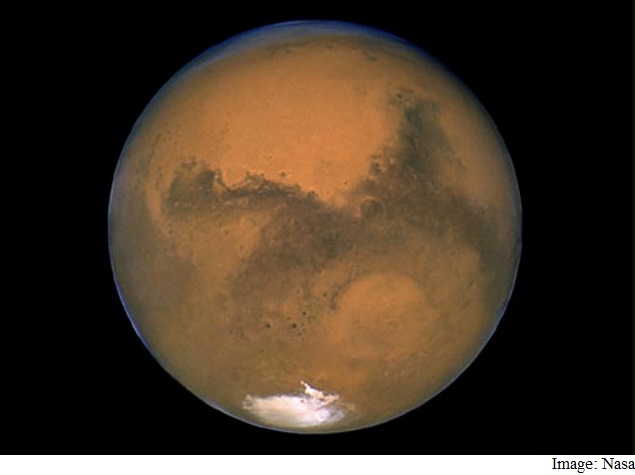- Home
- Science
- Science News
- Nasa Looks to Make Oxygen on Mars Using Microbes
Nasa Looks to Make Oxygen on Mars Using Microbes

Nasa is looking at creating ecosystems able to support life, for future human missions.
As part of this goal, it is funding Indiana-based company Techshot Inc. to research a solution that will produce oxygen that won't rely heavily on the Earth for future Martian colonies, www.ign.com reported.
"This is a possible way to support a human mission to Mars, producing oxygen without having to send heavy gas canisters," Eugene Boland, chief scientist at Techshot, was quoted as saying.
"Let's send microbes and let them do the heavy lifting for us," he added.
Techshot's experiments are carried out in a "Mars room" which simulates Mars' atmospheric pressure, day-night temperature changes and the solar radiation.
Using Martian soil, the scientists test the feasibility of using ecosystem-building pioneer organisms to produce oxygen. The organisms could also remove nitrogen from the Martian soil.
Boland believes habitable biodomes that "enclose ecopoiesis-provided oxygen through bacterial or algae-driven conversion systems" could exist on the Martian surface in the near future.
Nasa says its goal of landing astronauts on Mars in the 2030s is vital for obtaining evidence of life.
Nasa's Curiosity rover recently found evidence of fixed nitrogen and carbon-containing organic molecules - ingredients for life - on Mars' surface.
It is also now thought that ancient Mars held waterways and vast oceans covering its northern hemisphere.
Catch the latest from the Consumer Electronics Show on Gadgets 360, at our CES 2026 hub.
Related Stories
- Samsung Galaxy Unpacked 2025
- ChatGPT
- Redmi Note 14 Pro+
- iPhone 16
- Apple Vision Pro
- Oneplus 12
- OnePlus Nord CE 3 Lite 5G
- iPhone 13
- Xiaomi 14 Pro
- Oppo Find N3
- Tecno Spark Go (2023)
- Realme V30
- Best Phones Under 25000
- Samsung Galaxy S24 Series
- Cryptocurrency
- iQoo 12
- Samsung Galaxy S24 Ultra
- Giottus
- Samsung Galaxy Z Flip 5
- Apple 'Scary Fast'
- Housefull 5
- GoPro Hero 12 Black Review
- Invincible Season 2
- JioGlass
- HD Ready TV
- Laptop Under 50000
- Smartwatch Under 10000
- Latest Mobile Phones
- Compare Phones
- OPPO Reno 15 Pro Max
- Honor Win RT
- Honor Win
- Xiaomi 17 Ultra Leica Edition
- Xiaomi 17 Ultra
- Huawei Nova 15
- Huawei Nova 15 Pro
- Huawei Nova 15 Ultra
- Asus ProArt P16
- MacBook Pro 14-inch (M5, 2025)
- OPPO Pad Air 5
- Huawei MatePad 11.5 (2026)
- Xiaomi Watch 5
- Huawei Watch 10th Anniversary Edition
- Acerpure Nitro Z Series 100-inch QLED TV
- Samsung 43 Inch LED Ultra HD (4K) Smart TV (UA43UE81AFULXL)
- Asus ROG Ally
- Nintendo Switch Lite
- Haier 1.6 Ton 5 Star Inverter Split AC (HSU19G-MZAID5BN-INV)
- Haier 1.6 Ton 5 Star Inverter Split AC (HSU19G-MZAIM5BN-INV)

















